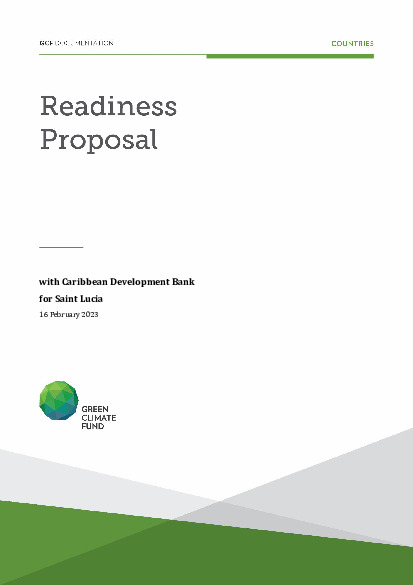Mainstreaming Climate Resilience into Water Sector Planning, Development and Operations in Saint Lucia

Mainstreaming Climate Resilience into Water Sector Planning, Development and Operations in Saint Lucia
This readiness will address the following barriers:
- Limited access to concessionary financing.
- Limited institutional capacity within the Water Utility Company to respond to climate change.
- Inadequate development of a pipeline of projects for climate resilient infrastructure to ensure safe and reliable water supply and sewerage services.
- Limited communication and public awareness of water supply issues relating to climate change.
Over the years the cadre of human resources of the utility company has been significantly depleted and the utility continues to face human resource constraints. At this point WASCO has embarked on various institutional strengthening initiatives geared at increasing the capacity of the agency to be more responsive to the impacts of climate change on the utility operations. This includes recruitment of new staff to fill vacant positions as well as training of all staff and ensuring an increased capacity to facilitate the delivery of climate resilient water supply and sewerage services and staff that are responsive to climate change issues in the execution of duties. This readiness will build upon previous initiatives.
Activities under this readiness initiative are designed to support the readiness outcomes and outputs. The capacity, systems and networks of the main water sector stakeholder WASCO will be enhanced to support the development and implementation of GCF-funded activities. This would result in the technical and administrative capacities being strengthened for the development of climate resilient initiatives. In addition, the communication strategy and associated action plan when implemented will catalyze behavioral change on climate related challenges. In addition, it is expected that there will be an enhanced capacity to develop and submit water sector concept notes and associated PPF requests addressing challenges of water security. This project is expected to develop and submit as least one concept note and associated draft PPF request. This would effectively address all the barriers highlighted previously and support the overall objective of the project to mainstream climate resilience into water sector planning development and operations in Saint Lucia through the strengthening of WASCO.
The purpose of this readiness project is to support the capacity building and institutional strengthening of WASCO to facilitate mainstreaming of climate resilience into water sector planning, development and operations in Saint Lucia.
The goal of this initiative would be the development and implementation of systems and networks to support the strengthening of WASCO’s adaptation capacity with specific focus on improving the resilience and reliability of water and wastewater services. Additionally, WASCO would be better placed to plan and develop climate resilient water supply and wastewater projects.
In an effort to achieve the outputs highlighted above the following the activities are proposed in this project includes institutional assessments, project management capacity assessments, capacity building through training and implementation of industry best practices, development of knowledge products and provision of technical support. The project will also ensure communication of key water sector and climate change issues to all beneficiaries. The development of a water sector investment pipeline will be facilitated through initiation of background studies and knowledge tools which would support the development of project Concept Notes.
The direct beneficiaries would be WASCO staff (technical management, administration) of 125 persons and in addition all 414 members of staff will benefit from the communication campaign. In addition, select personnel from the Department of Infrastructure, Ports and Transport, Water Resources Management Agency (WRMA), National Integrated Planning and Programming (NIPP) Unit will also benefit from project activities. The majority of the population will benefit directly from the Public Awareness and Education Campaign. These beneficiaries include main economic sector stakeholders such as tourism, agriculture, industry as well as institutions (schools). The public awareness and education campaign also include the private sector and civil society organisations. The private sector will include commercial banks and credit unions who can provide financing for water sector actions. The target audience will be captured in the communication strategy and action plan. Indirectly, the entire WASCO customer base will benefit from the capacity building and institutional strengthening of the staff and the resulting improvements in building resilience of the water sector. This would enhance WASCO’s ability to support the implementation of future GCF Water Sector Projects including the water sector pipeline project included in the country program 1.